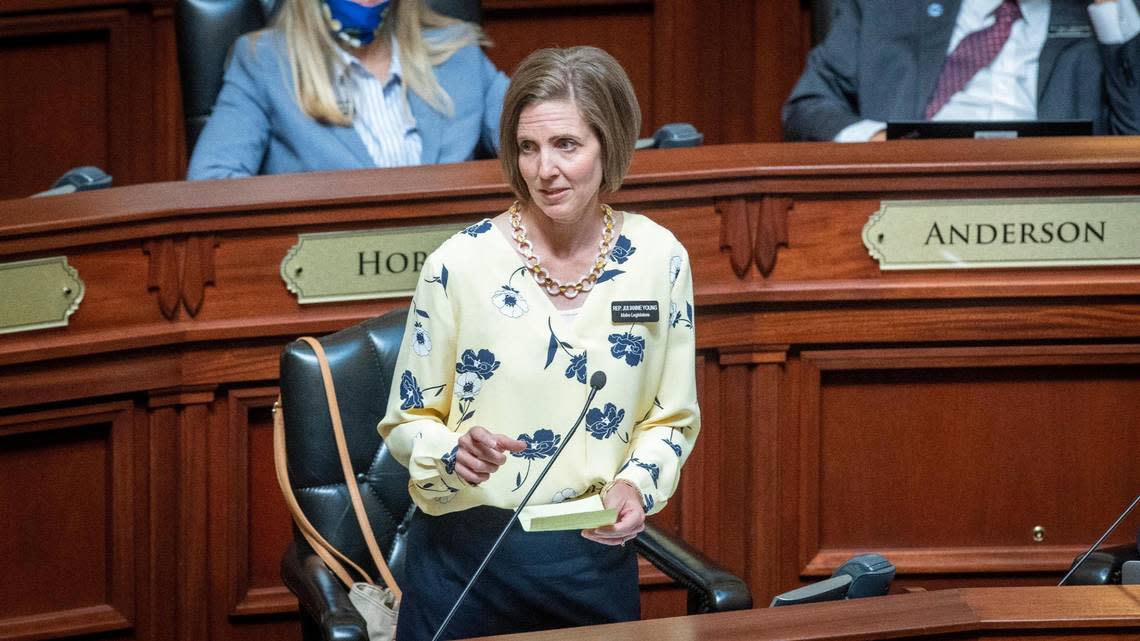Time to pay the lawyers again: Idaho lawmakers’ plan is going to cost you in court | Opinion

- Oops!Something went wrong.Please try again later.
The state Senate will soon decide whether to engage in what’s fast becoming one of Idaho’s grand annual traditions: Using your money to pay civil rights attorneys for the service of correcting the Legislature’s willful violations of the state and federal constitutions — and infringing on your rights.
The unconstitutional bill you’re likely to be paying for this year is House Bill 668, which is designed to prohibit the use of public funds to pay for gender-affirming care.
The bill is sponsored by Rep. Bruce Skaug, R-Nampa, and Rep. Julianne Young, R-Blackfoot, two lawmakers who have decided that the central purpose of their legislative careers is to use government force to engage in discrimination against Idahoans whose lives they don’t understand or approve of.
The bill has already passed the House by a wide margin and cleared the Senate State Affairs Committee, meaning the last real hurdle is a vote on the Senate floor. There wouldn’t be much cause for optimism any year, and it’s particularly true ahead of a primary election, which has a way of turning backbones into jelly.
During the Senate State Affairs Committee hearing, Young called H668 a “taxpayer bill.” Its main purpose, she said, is to protect taxpayers from massive spending on hormone therapy and even surgeries for Medicaid recipients.
It’s awfully strange, then, that she and the other sponsors couldn’t be bothered to find out how much taxpayers are spending on gender-affirming care, if anything. So the potential savings, if there is any, is entirely unknown. They assert it could be millions, based on things they’ve heard are happening in California, a state with about 20 times Idaho’s population.
Though these savings might be nil, here’s what’s certain to cost taxpayers: paying the lawyers who sue the state once the bill is found to be unconstitutional and, regular as the sunrise, Idaho is ordered to pay the attorney fees. Unlike the entirely unevidenced claim that the bill will save taxpayers, there’s plenty of clear reason to expect that this will happen.
Basically every time the Legislature passes a bill that in any way deals with transgender issues, it’s unconstitutional. The transgender sports ban, the transgender birth certificate ban and the transgender care ban have all been found to be at least probably unconstitutional and stayed.
Bills sponsored by Young are especially likely to be found unconstitutional. Young was the author of the ban on trans Idahoans receiving birth certificates and other state documents with their identified gender. She did this in defiance of a federal court order which had specifically told Idaho not to do that. So the law’s only effect was to rack up over $320,000 in legal fees for taxpayers.
A lawyer who has repeatedly successfully sued Idaho for doing unconstitutional things warned them that this is yet another. “I think it’s going to cost taxpayers millions of dollars,” said Howard Belodoff.
Belodoff is probably most famous for filing a lawsuit in the 1980s that forced Idaho to totally reform its child mental health care system (much to the state’s benefit). He also led the litigation that struck down Boise’s unconstitutional criminalization of homelessness. When he says something is unconstitutional, he’s usually proven right.
And why is H668 unconstitutional? It’s rather simple.
As Lily Pannkuk pointed out during public testimony, nearly all of the drugs used for gender-affirming care are used for other medically necessary purposes, as well — for precocious puberty, treatment of prostate cancer survivors, for hormone replacement therapy and for other medical applications. Under the law, these drugs will be covered if you’re cisgender but not if you’re transgender.
Young confirmed this during testimony when asked whether coverage for penile implants to correct erectile dysfunction would be disrupted by the bill. She affirmed that it would not. Because what’s targeted by the bill is not a drug or procedure but the population for which it’s used. It’s hard to design a clearer violation of the Equal Protection Clause.
So get your pocketbook ready. Because unless there’s a miracle on the Senate floor, you’ll be paying a lawyer to scrape this crud off the lawbooks sooner than later.
Bryan Clark is an opinion writer with the Idaho Statesman.

